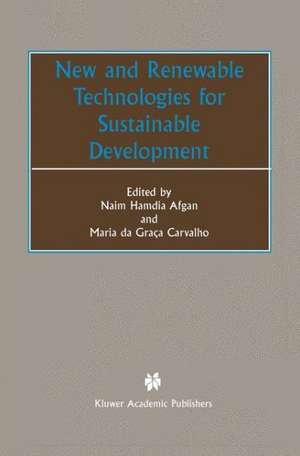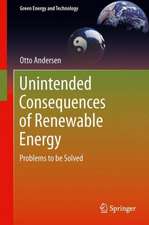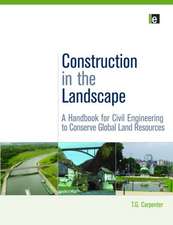New and Renewable Technologies for Sustainable Development
Editat de Naim Hamdia Afgan, Maria Cristina Ramos de Carvalhoen Limba Engleză Paperback – 4 noi 2012
| Toate formatele și edițiile | Preț | Express |
|---|---|---|
| Paperback (1) | 964.71 lei 6-8 săpt. | |
| Springer Us – 4 noi 2012 | 964.71 lei 6-8 săpt. | |
| Hardback (1) | 968.65 lei 6-8 săpt. | |
| Springer Us – 30 dec 2002 | 968.65 lei 6-8 săpt. |
Preț: 964.71 lei
Preț vechi: 1176.47 lei
-18% Nou
Puncte Express: 1447
Preț estimativ în valută:
184.63€ • 192.24$ • 156.03£
184.63€ • 192.24$ • 156.03£
Carte tipărită la comandă
Livrare economică 07-21 martie
Preluare comenzi: 021 569.72.76
Specificații
ISBN-13: 9781461350095
ISBN-10: 1461350093
Pagini: 724
Ilustrații: XII, 710 p.
Dimensiuni: 155 x 235 x 38 mm
Greutate: 1 kg
Ediția:2002
Editura: Springer Us
Colecția Springer
Locul publicării:New York, NY, United States
ISBN-10: 1461350093
Pagini: 724
Ilustrații: XII, 710 p.
Dimensiuni: 155 x 235 x 38 mm
Greutate: 1 kg
Ediția:2002
Editura: Springer Us
Colecția Springer
Locul publicării:New York, NY, United States
Public țintă
ResearchDescriere
Sustainable development encompasses economic, social, and ecological perspectives of conservation and change in natural resources. It is generally defined as development that meets the needs of the present without compromising the ability of future generations to meet their own needs. This definition is based on the ethical imperative of equity within and between generations. Moreover, apart from meeting; "the basic needs of all"; sustainable development implies sustaining the natural life support systems on Earth, and extending to all the opportunity to satisfy their aspirations for a better life. Hence, sustainable development is more precisely defined as a process of change in which the exploitation of resources, the direction of investments, the orientation of technological development, and institutional change are all in harmony and enhance both current and future potential to meet human needs and aspiration. To date, various definitions and stationary-state criteria of sustainability have been proposed. Many authors have been concerned with only part of the problem, such as the technological assumptions, the ability to substitute natural resources in economic transformation processes, and the resilience and importance of ecological processes. But, the social dimension did not receive the same attention, and has not been adequately integrated into formal analysis. The engineering community has to play an important role in sustainable development with appropriate evaluation of the engineering systems. In this respect energy, water and environment systems require multi-criteria evaluation methods for the assessment of the economic, environmental and social aspect of the systems.
Cuprins
Preface. 1: Sustainability Development in Energy Strategy. Advantage of the Renewable Energies at Madeira Island: Electrical Power Production; M.J. Fernandes, et al. Sustainability Assessment of Renewable Energy Systems; N.H. Afgan, et al. Design and Optimization of Forced Convection Heat Sinks for Sustainable Development. A. Bar-Cohen, et al. Bioenergetics Conversion of Biochemical to Mechanical Energy; S. Sideman, A. Landesberg. Comparison between SIMEA and SENECA Methods for Social Impact Analysis of Energy Systems; F. Orecchini, et al. Sustainable Energy Scenarios Using Green Energy for India; L. Suganthi, A. Williams. Assessing Urban Environment Sustainability by Means of Indicators: The Case of the Heritage Buildings; M. La Gennusa, et al. Kyoto Protocol Objectives by Promoting the Technology Transfer to Small Island Development Countries: Santo Antao, Cape Verde; N. Duic, et al. 2: Economic Evaluation of New and Renewable Energy Source. Constructal Optimization of Tree-Shaped Paths for the Collection and Distribution of Fluid, Electricity, Goods and People; A. Bejan. An Overview of Gas Turbine Technologies for Power Generation in Europe; P.A. Pilavachi. Pricing the Energy Supplied by Renewable Sources: An Assessment of the Portuguese Situation; R.M.G. Castro, J.P. Sucena Paiva. Sustainable Utilization of Paper Sludge for Energy Conversion: Economic Potential and Environmental Feasibility; B. Coda, et al. Cost Optimization of a Cogeneration Plant; Z. Bogdan, et al. An Integrated Methodology for Regional Energy Planning in Isolated Areas: Application in the Cape Verde Islands; D.Th. Askounis, et al. Modern Financial Mechanisms for Renewable Energy Technologies; D.Th. Askounis, et al. Advanced Sustainable Integrated Systems for Total Building Energy Supply; E. Entchev. Assessment of Renewable Energy Sources Using a Geographical Information System; A. Costa, et al. Kyoto Protocol Objectives in Croatia Energy Planning; N. Duic, et al. Renewable Energies in the Canary Islands: Actual Situation and Perspectives; J. Schallenberg. Results of an Experimental Investigation of Naturally Ventilated Building; P. Principi, et al. Safety Assessment of Hydrogen as a Fuel for Vehicles by Numerical Simulation; H. Wilkening, et al. Possibilities of Reducing Energy Costs by Using CHP Systems in anUrban Area of the Sarajevo Region; T. Sadovic, N. Delatic. 3: Solar Energy Utilisation. Expert System for New and Renewable Energies; F. Orecchini, et al. Photovoltaics R & D: A Tour through the 21st Century; L.L. Kazmerski. The Use of Solar Energy in a District Heating System in Finland: Case Study of Six District Heating Plants; M. Lesinkin. Solar Air Conditioning for Buildings; I. Romey, G. Markert. Experimental Study of a Passive System: A Ventilated Wall; S. Lorente, M. Bégué. Overall Performance of Advanced Glazing Windows in Nonresidential Buildings: Heat Extraction and Energy Requirements; F. Gugliermetti, L. Grossi. Photovoltaic Solar Cells with Thin Film Materials; N. Kesri, et al. Photovoltaic Devices: a 2000 Overview; L.L. Kazmerski. 4: Fuel Cells Development. Suitability of Metallic Materials for Interconnects in Solid Oxide Fuel Cells; W.J. Quadakkers, et al. Fuel Cell Buses: a Sustainable Technology for the Urban Passenger Transportation Sector; P.P. Pinto, et al. Fuel Cells and the Future of Motorization; K. Ledja. Fuel Cell-Based Renewable Energy Supply: Sustainable Energy for Isolated and Island Communities; A. Bauen, et al. Sustainable Heat and Electricity from Sugarcane










